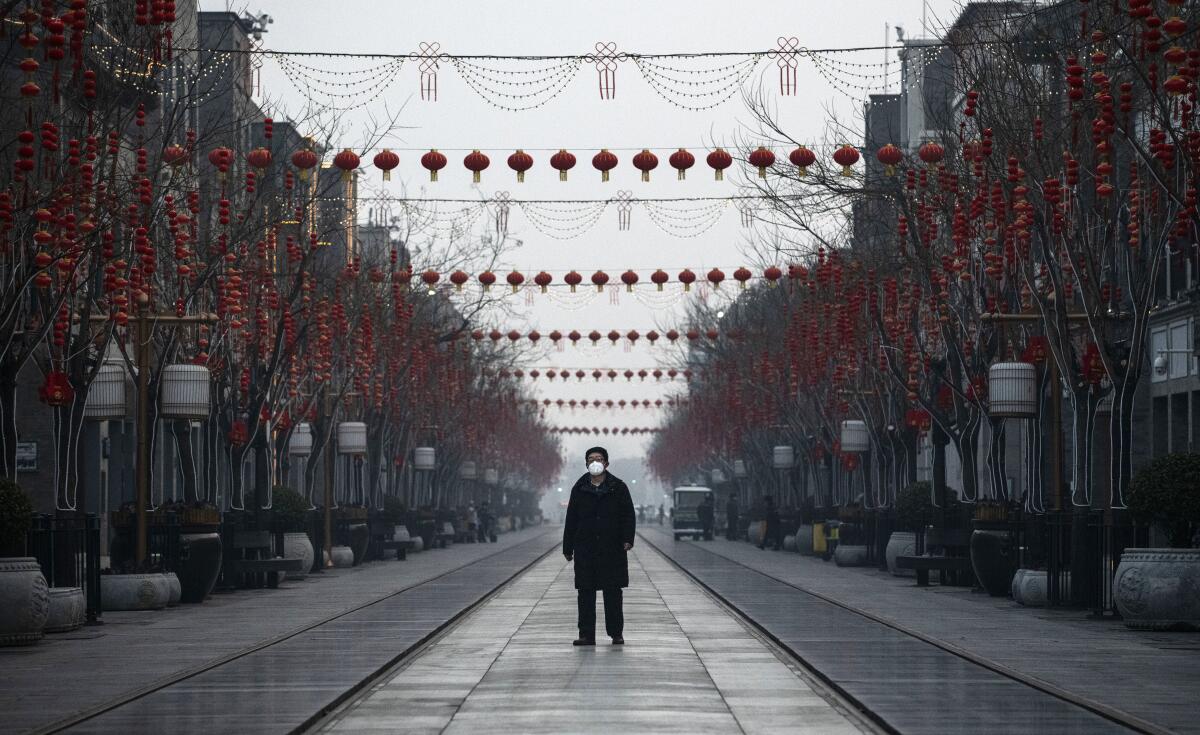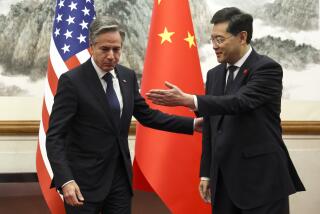In tit for tat, Trump limits number of Chinese journalists in U.S.

WASHINGTON â The Trump administration on Monday ordered several Chinese media organizations to dismiss 60 U.S.-based Chinese nationals in retaliation for a âlong-standing trendâ of actions by Beijing against journalists, including the expulsion last month of three Wall Street Journal reporters.
The action could in effect force many of the Chinese nationals to leave the United States. It applies only to Chinese citizens, not employees of other nationalities.
The state-controlled New China News Agency and three other organizations will be required to reduce their total staff of 160 Chinese nationals to 100, senior State Department officials said. In the case of the New China News Agency, for example, only 59 Chinese nationals may be employed. Overall, the reduction is nearly 40% of the companiesâ U.S.-based staff. The other state-run companies are China Global Television Network, China Radio International and China Daily.
Administration officials cited the expulsion last month of three Wall Street Journal reporters, but also a string of measures against both Chinese and American journalists, including the disappearance of citizen activists who reported on the beginnings of the coronavirus in China.
Secretary of State Michael R. Pompeo said Beijingâs restrictions on the press were âmisguided.â
âOur goal is reciprocity,â Pompeo said in an statement. âAs we have done in other areas of the U.S.-China relationship, we seek to establish a long-overdue level playing field. It is our hope that this action will spur Beijing to adopt a more fair and reciprocal approach to U.S. and other foreign press in China.â
Chinaâs expulsion of the Wall Street Journal employees â for what Chinese authorities called an offensive op-ed headline â came a day after the Trump administrationâs Feb. 18 designation of all four of the Chinese media companies as âforeign missions of the Peopleâs Republic of China,â a category that regards them as extensions of the Beijing government. Like an embassy, all were required to register personnel with the State Department and get permission to lease or buy property.
With Mondayâs action, the entities have until Friday to name the employees who will be dismissed, and they must no longer be employed as of March 13.
A fifth company, the distributor of Peopleâs Daily, was also in the Feb. 18 designation but was not subjected to the limit on staffing because it has so few employees, officials said.
The administration officials who announced Mondayâs actions emphasized what they described as the distinction between independent U.S. media and âpropaganda organsâ that work at the behest of the Chinese Communist Party. Chinese employees who remain on staff will not be restricted in what they cover, the officials said.
âThis is no way restricts the ability of people working for Chinese propaganda outlets to conduct their, you know, reporting activities,â a senior administration official said, briefing reporters anonymously in keeping with White House protocol.
In addition to the cap on personnel, the administration is imposing a âduration of stayâ addendum to visas that Chinese obtain to work in the U.S. as journalists, which means they will be required to renew the permits periodically. It is a measure similar to a requirement that Beijing uses for U.S. and other foreign journalists working in China.
In Beijing, the Foreign Correspondentsâ Club of China reported in a new survey that conditions for the working press have deteriorated in China substantially. Since President Xi Jinping consolidated power in 2013, the group said, China has forced out nine foreign journalists âeither through outright expulsion or by non-renewal of visas.â The organization said it fears more expulsions.
âThe influence and pressure brought to bear on foreign journalists in China reflects how Chinese authorities extend their reach and scope in chilling ways to ensure the âChina storyâ has but one narrative â theirs,â the report says, noting that Chinese government officials frequently use state-run media to attack any reporting seen as critical of the country.
Administration officials acknowledged that the new limits on Chinese staffing in the U.S. might trigger further backlash against American journalists in Beijing.
âIt would be a shame,â the administration official said. âKicking out more and more foreign reporters is only going to lead to a situation where China goes completely opaque. Thatâs going to have a massive knock-on effect on the willingness of investors, businessmen and others to engage there.â
Noting that the Trump administration has also had a hostile relationship with the press, journalism advocacy groups criticized the personnel caps announced Monday.
âChina and the United States need to pull back from this dangerous cycle of tit-for-tat retaliation that threatens the free flow of information in both countries â especially during a global health crisis,â Steven Butler, head of the Asia program at the New York-based Committee to Protect Journalists, said in a statement. âAs a democracy with a strong constitutional guarantee of freedom of the press, the U.S. in particular must show leadership in the area of press freedom, rather than adopting Beijingâs authoritarian tactics.â
More to Read
Get the L.A. Times Politics newsletter
Deeply reported insights into legislation, politics and policy from Sacramento, Washington and beyond. In your inbox three times per week.
You may occasionally receive promotional content from the Los Angeles Times.











